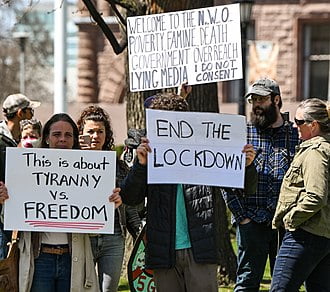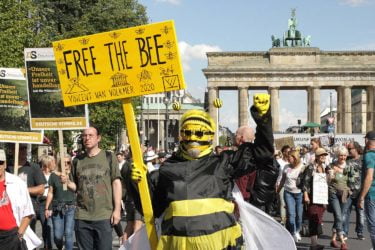The thing with conspiracy theories is that they go right to the top: the brain. Seeking out information which supports our pre-existing beliefs is what humans are good at, and these confirmation biases help fuel conspiracy theorising behaviour. Finding information which supports our suspicions and beliefs is a comforting behaviour, which is why we tend to reject conflicting information as less likely to be accurate and as from untrustworthy sources (even when it isn’t). The pattern seeking habits which are hard-wired into our brains make it easy for us to connect dots which aren’t connected and see motives and intentions where none truly exist. In some instances, this is harmless and will cause people to see faces in toast, but in the right (or wrong) circumstances it can have devastating consequences.
Belief in conspiracy theories often correlates with feelings of powerlessness and a perceived lack of control in one’s life. Conspiracy theories offer up a person or group to pinpoint as responsible for a secret plot or nefarious plan which allows an individual to feel as though they are regaining some control and order in the chaos. However, conspiracy belief doesn’t help thwart these anxieties in the long term as the theories don’t address the actual cause of the issues a person may be experiencing in their life. Subscribing to one conspiracy theory and accepting that someone is out to get them is likely to make an individual consider other conspiracy theories to be plausible too. As a result, a person’s level of mistrust rises, as do their anxieties about their perceived lack of control and power and the world around them, and so a vicious cycle ensues.

I live in the sleepy Wiltshire town of Bradford on Avon and recently I accidentally became caught up in a conspiracy myself. In response to the COVID-19 crisis, Bradford on Avon Town Council put a one-way road system in place and cordoned off parts of the road so pedestrians can socially distance while using the old, narrow pavements. This did not go down well with motorists and, according to some, was in fact a plot for some form of social domination and control by outside forces. My involvement? I’m an administrator for local Facebook groups, and along with my fellow administrators, I deleted threatening and slanderous comments that people made in the groups. As a result, it was claimed that we were complicit in silencing people who dissented, clearly at the order of the New World Order town council.
As one of “the admins” I noticed that during the UK lockdown the posting habits of group members shifted and there was a very obvious increase in the amount of misinformation being shared by people which they hadn’t fact checked. This inability to distinguish facts from fact-like fictions is partly due to a lack of critical thinking skills – which would allow an individual to analyse and fact-check information in a rational manner – exacerbated by the sheer volume of information a person is subjected to daily, much of which they probably don’t understand. The World Health Organisation refers to this as an Infodemic, described as ‘an over-abundance of information – some accurate and some not – that makes it hard for people to find trustworthy sources and reliable guidance when they need it.’
So, while furloughed from my full time job, I found my time taken up instead with fact checking the claims people were making in social media groups, deleting hoaxes and false claims all while urging people to fact check for themselves, and offering a list of ways in which they could. On several occasions, to refute the false claims being made in the groups, I shared links to academic studies which was met with responses like “I trust common sense more than universities”, “I don’t trust official sources”, “wake up”, and “they tell you what to think because they don’t want us to think for ourselves.”
At a time when the world is gripped by a viral pandemic which not only kills people at an alarming rate but is leaving survivors with serious health issues, this sort of sharing of misinformation and distrust of factual sources can have serious consequences. Especially as research has found that people who believe in false reporting and conspiracy theories about diseases are ‘less likely to behave in a way that would protect themselves and others, such as washing their hands frequently and keeping away from other people if they have any symptoms.’
Research conducted by Ipsos Mori for King’s College London also found that almost 60% of those who believe there’s no evidence that COVID-19 is real use Facebook to source the information on which they base such beliefs. Meanwhile 60% of those who believe the virus is linked to 5G radiation got their information from YouTube. Both platforms have rolled out responses to the spread of such potentially dangerous misinformation by users, while also collaborating with the World Health Organisation and the National Health Service to provide accurate information about COVID-19.
However, earlier this month, the Centre for Countering Digital Hate (CCDH) released a report which condemned the misinformation tackling efforts of Facebook, Instagram, Twitter, and YouTube after they found fewer than 1 in 20 reports of false or misleading information were dealt with by the platform. For example, CCDH researchers reported 569 posts by Facebook users which shared rule-breaking misinformation promoting anti-vaccination narratives. One example included the claim that the only way to catch a virus was to be “injected with one via a vaccine”. Only 14 of the reported posts were removed, and Facebook added warnings to just 19 others meaning the platform acted on less than 6% of the reports.

Yet, it’s also important to question whether deleting misleading posts is the most effective way of stemming the spread of this sort of misinformation. During the lockdown in the UK, social psychologist Dr Daniel Jolley was interviewed on The Guardian’s ‘Science Weekly’ podcast about the psychology of conspiracy theories. Jolley suggested that by deleting misleading posts about subjects like Coronavirus and 5G, platforms such as Facebook and YouTube could risk playing into the narrative of conspiracy theorists who may see such reactions as proof of a cover-up. Just as I experienced when deleting Facebook posts made by others about the social distancing efforts in my town. Jolley suggests that allowing conversations about conspiracy ideas to happen openly could be the right move, but in a way which makes clear that the claims made are not factual.
For example, inoculation interventions which offer pre-emptive warnings about subsequently viewed misinformation have been shown to reduce the persuasiveness of the misinformation. While research in the US and India has shown that helping people to develop their digital literacy by teaching them critical thinking skills and how to spot fake information can improve their ability to fact-check information they encounter online, while elsewhere researchers found that communicating fact-based information about the risks posed by infectious diseases, such as Measles, can be a more effective way of countering anti-vaccination beliefs and arguments compared to directly countering and debunking anti-vaccination conspiracies.
Ultimately, human biases make us all susceptible to conspiracy theorising. There is scope for social media platforms to do more to counter the sharing of misinformation by their users – especially that which leads to violence or promotes dangerous health claims. Some are calling for government interventions to make social media companies legally obliged to step up their game on this front. Whether this happens or not, it’s clear that the key is finding the right evidence-based approaches to take when tackling conspiracy theorising to ensure the most effective outcome in helping people stay informed.



